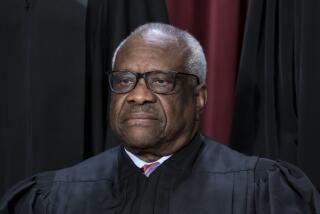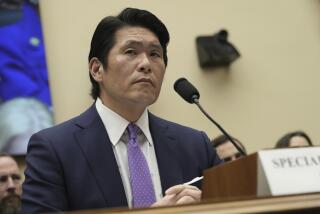Senate Democrats May Extend Inquiry on Bolton
- Share via
WASHINGTON — Lawrence Wilkerson, who served as chief of staff to former Secretary of State Colin L. Powell, met with Senate aides Friday to explain his objections to the nomination of John R. Bolton as U.S. ambassador to the United Nations, staff members said.
The meeting between Wilkerson and staff members of the Senate Foreign Relations Committee took place on the final day set aside for interviews of witnesses as the committee formally wrapped up its investigation of Bolton before a vote scheduled for Thursday.
But though Sen. Richard G. Lugar (R-Ind.), the committee chairman, may believe the inquiry has ended, Democrats on the panel said more information was needed. And aides said the Democrats might try to extend the investigation.
The State Department sent additional documents related to the inquiry to the committee Friday, but Democratic aides complained that all the papers they wanted were not included. On Thursday, Sen. Joseph R. Biden Jr. of Delaware, the senior committee Democrat, sent a letter to Secretary of State Condoleezza Rice warning that the Democrats might seek a delay if documents were not produced.
Democratic aides said the documents sent Friday did not include material they had requested on how Bolton had used intelligence information in his official speeches. Biden was “rather unhappy” that Democrats were being treated in a “cavalier manner,” spokesman Norm Kurz said.
Wilkerson, a longtime aide to Powell, has said in interviews that he believed Bolton would be incapable of listening and would be a poor U.N. ambassador as a result. Wilkerson “reiterated and amplified” those comments in his meeting with staffers, a Democratic aide said.
Powell, who has not taken a stand publicly on Bolton’s nomination, clashed with Bolton at the State Department. Powell is believed to have expressed concerns in conversations with Senate Republicans.
Also interviewed Friday was Robert L. Hutchings, former chairman of the National Intelligence Council. Hutchings led the organization at a time when its analysts clashed with Bolton -- who was then undersecretary of State for arms control -- over the extent of the threat from Syria.
Staff members also met with Otto Reich, former assistant secretary of State for Latin America. Reich backed Bolton in an effort to remove an intelligence analyst who disagreed with Bolton, Senate Democrats have said.
Andy Fisher, a Lugar spokesman, said the committee had spoken with about 30 people over the last two weeks, exhausting its interview list.
“We’re wrapping it up,” he said.
Bolton has been accused by Democrats of misusing intelligence data, bullying subordinates and trying to penalize intelligence analysts who differed with him. Fisher said the interviews had produced no new information to substantiate charges that Bolton had altered intelligence or undermined administration policy.
Still unsettled is the difficult question of how to handle the committee’s requests for information on 10 “intelligence intercepts” concerning U.S. officials whose overseas communications were monitored by intelligence agencies.
Bolton sought the information while he was undersecretary of State. Senators agreed that the Senate Intelligence Committee would obtain the classified material from the National Security Agency, and work out a way to share it with the Foreign Relations Committee.
But the Intelligence Committee has not obtained the information. Aides said it remained unclear whether they would receive it or when. Any such move must be approved by John D. Negroponte, the director of national intelligence.
“We are officially frustrated,” said a Democratic aide on the Senate Intelligence Committee. “We have been unable to get access to these NSA intercepts, any information related to these NSA intercepts, and have been unable to get the DNI’s office to tell us when or how we may get access to these things.”
*
Times staff writer Greg Miller contributed to this report.
More to Read
Get the L.A. Times Politics newsletter
Deeply reported insights into legislation, politics and policy from Sacramento, Washington and beyond. In your inbox three times per week.
You may occasionally receive promotional content from the Los Angeles Times.











